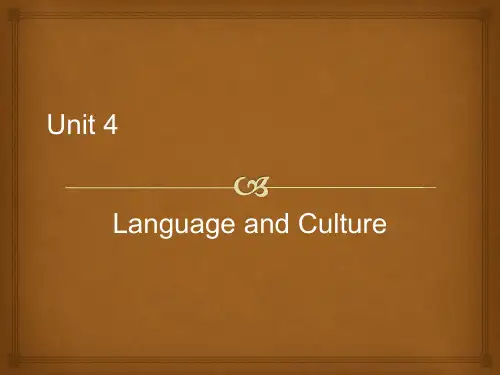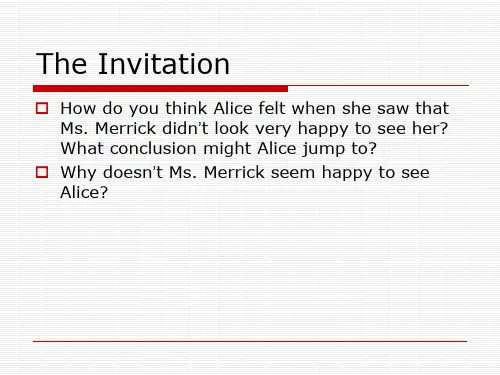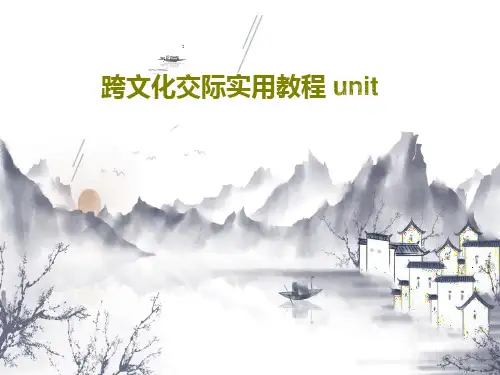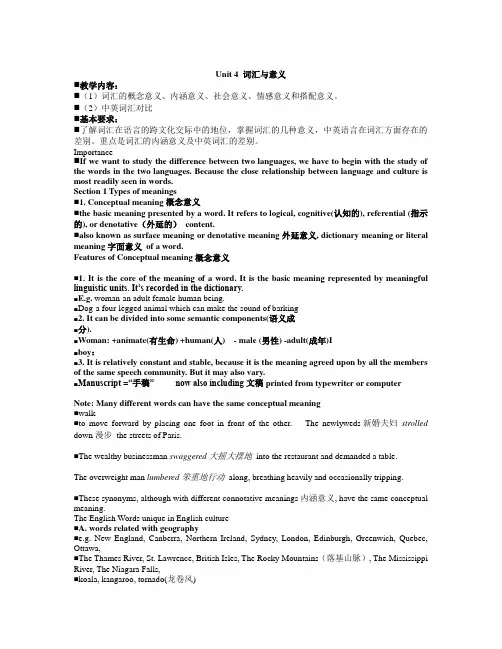跨文化交际课程unit4
跨文化交际Unit4

பைடு நூலகம்
More examples
“Why time flies?”
“Because somebody wants to kill it.” “你有什么了不起,能把我吃了!”
“不能,我是回民!” 外甥打灯笼照(舅)旧
Language = neutral codes and grammatical rules? We make cultural choices when we select words,
form sentences and send a message. All languages have social questions and information
as before; as usual; as of old 狗撵鸭子呱呱叫
very good
More examples
恋爱“三草”原则: 女:你说你很寂寞,为什么不去找你以前的女朋友而来追我
呢?
男:好马不吃回头草!(A good horse will never turn round to graze on an old pasture.)
meaning comes out of the context, the cultural usage.
Reading I How Is Language Related to Culture
Language reflects the environment in which we live. (snow, wine)
More examples
I am sorry. I am sorry, too. I am sorry three. What are you sorry for (four)? I am sorry five.
跨文化交际-Unit 4

Culture Shock
It is a feeling of being confused and overwhelmed by life in another culture. It is caused by the anxiety that results from losing all our familiar signs and symbols of social intercourse. These signs or cues include the thousand and one ways in which we orient ourselves to the situation of daily life: how to give orders, how to make purchases, when and where not to respond. Now these cues which may be words, gestures, facial expressions, customs, or norms are acquired by all of us in the course of growing up and are as much a part of our culture as the language we speak or the beliefs we accept. All of us depend for our peace of mind and efficiency on hundreds of these cues, most of which we are not consciously aware.
Causes of cultural shock
跨文化交际实用教程 unit41页文档

谢谢你的阅读
❖ 知识就是财富 ❖ 丰富你的人生
71、既然我已经踏上这条道路,那么,任何东西都不应妨碍我沿着这条路走下去。——康德 72、家庭成为快乐的种子在外也不致成为障碍物但在旅行之际却是夜间的伴侣。——西塞罗 73、坚持意志伟大的事业需要始终不渝的精神。——伏尔泰 74、路漫漫其修道远,吾将上下而求索。——屈原 75、内外相应,言行相称。——韩非
1、不要轻言放弃,否则对不起自己。
2、要冒一次险!整个生命就是一场冒险。走得最远的人,常是愿意 去做,并愿意去冒险的人。“稳妥”之船,从未能从岸边走远。-戴尔.卡耐基。
梦 境பைடு நூலகம்
3、人生就像一杯没有加糖的咖啡,喝起来是苦涩的,回味起来却有 久久不会退去的余香。
跨文化交际实用教程 unit 4、守业的最好办法就是不断的发展。 5、当爱不能完美,我宁愿选择无悔,不管来生多么美丽,我不愿失 去今生对你的记忆,我不求天长地久的美景,我只要生生世世的轮 回里有你。
大学英语跨文化交际chapter4 Intercultural Communication Barriers

Most other cultures are backward compared with my culture. My culture should be the role model for other cultures. Other cultures should try to be more like my culture. Most people from other cultures just don’t know what’s good for them. I have little respect for the values and customs of other cultures. Most people would be happier if they lived like people in my culture. People in my culture have just about the best lifestyles of anywhere. Lifestyles in other cultures are not as valid as those in my culture. I do not cooperate with people who are different. I do not trust people who are different. I dislike interacting with people from different cultures. Other cultures are smart to look up to my culture. Other people are much the same as my people. Our way of doing things is the only right way.
跨文化交际-Unit 4

Symptoms of culture shock
Stereotyping of host nationals Hostility toward host nationals Loss of ability to work effectively Unexplained fits of weeping Physical ailments (psychosomatic disorder)
The Invitation
How do you think Alice felt when she saw that Ms. Merrick didn‟t look very happy to see her? What conclusion might Alice jump to? Why doesn‟t Ms. Merrick seem happy to see Alice?
The Shopper
Usages (word combinations)
For sure Un/receptive toward To practice with To practice on To get tired of In the way In a bad mood To catch (someone) on a bad day
Culture identity
A highly abstract, dynamic, multifaceted concept that defines who you are. Every individual has multiple identities, e.g., race, ethnic, gender, national, regional, organizational, personal, cyber/fantasy, that act in concert. The importance of any single identity is a result of the situation.
跨文化交际unit4解析

Unit 4 词汇与意义⏹教学内容:⏹(1)词汇的概念意义、内涵意义、社会意义、情感意义和搭配意义。
⏹(2)中英词汇对比⏹基本要求:⏹了解词汇在语言的跨文化交际中的地位,掌握词汇的几种意义,中英语言在词汇方面存在的差别。
重点是词汇的内涵意义及中英词汇的差别。
Importance⏹If we want to study the difference between two languages, we have to begin with the study of the words in the two languages. Because the close relationship between language and culture is most readily seen in words.Section 1 Types of meanings⏹1. Conceptual meaning概念意义⏹the basic meaning presented by a word. It refers to logical, cognitive(认知的), referential (指示的), or denotative(外延的)content.⏹also known as surface meaning or denotative meaning外延意义, dictionary meaning or literal meaning字面意义of a word.Features of Conceptual meaning概念意义⏹1. It is the core of the meaning of a word. It is the basic meaning represented by meaningful linguistic units. It’s recorded in the dictionary.⏹E.g. woman-an adult female human being.⏹Dog-a four-legged animal which can make the sound of barking⏹2. It can be divided into some semantic components(语义成⏹分).⏹Woman: +animate(有生命) +human(人) - male (男性) -adult(成年)I⏹boy:⏹3. It is relatively constant and stable, because it is the meaning agreed upon by all the members of the same speech community.But it may also vary.⏹Manuscript =“手稿” now also including文稿printed from typewriter or computer Note: Many different words can have the same conceptual meaning⏹walk⏹to move forward by placing one foot in front of the other. The newlyweds新婚夫妇strolled down漫步the streets of Paris.⏹The wealthy businessman swaggered大摇大摆地into the restaurant and demanded a table.The overweight man lumbered笨重地行动along, breathing heavily and occasionally tripping.⏹These synonyms, although with different connotative meanings内涵意义, have the same conceptual meaning.The English Words unique in English culture⏹A. words related with geography⏹e.g. New England, Canberra, Northern Ireland, Sydney, London, Edinburgh, Greenwich, Quebec, Ottawa,⏹The Thames River, St. Lawrence, British Isles, The Rocky Mountains(落基山脉), The Mississippi River, The Niagara Falls,⏹koala, kangaroo, tornado(龙卷风)⏹The Great Barrier Reef, Silicon Valley, Yellowstone Park,⏹Summary:All these have their own geographical features: places, plants and animals uniquely found in USA, Great Britain and Australia; They all represent meaning unique in their own cultures;Their Chinese equivalents are only used by the Chinese people as mere names, which have lost their distinctive geographical and cultural features.The English Words unique in English culture⏹A. words related with geography⏹e.g.⏹U.S.A: New England, The Rocky Mountains,The Mississippi River, The Niagara Falls,Yellowstone Park, Silicon Valley⏹Britain: British Isles, Northern Ireland, London, Edinburgh, Greenwich, The Thames River, Rose⏹Canada: Ottawa, Quebec, St. Lawrence,⏹Australia: Canberra, Sydney, The Great Barrier Reef, koala, kangaroo⏹B. words and history⏹the May Flower⏹(the ship in which a group of⏹British Puritans who were also⏹known as pilgrim fathers sailed to⏹America in 1620.⏹The revolutionary war⏹( the struggle of the 13 colonies in North America for independence from the British rule between 1775-1783)⏹Scalp(头皮)⏹(to tear the skin on the top and back of head and the hair attached from an enemy by an North American Indian as a trophy战利品)⏹⏹Knight⏹(a man given the rank of knighthood by the British Monarch in recognition of merits in public service)⏹Hippy/Hippie⏹(a young man and young woman who rejects authority, existing institutions and conventional attitudes towards morality, style of dress, etc.)⏹C. word and politics⏹USA: President, Secretary, Congress, Senate, the House of Representatives, The Democratic Party, The Republican Party, the Supreme Court⏹Great Britain: Parliament议会:the supreme legislative body of the United Kingdom. It comprises the sovereign, the House of Lords and the House of Commons.议会两院尤指英国由上议院和下议院构成的国家立法机关; Prime Minister, The Conservative Party, The Labour Party, Supreme Court of Judicature司法⏹Governor行政长官⏹the official title of the representative of the British monarch in a British colony.⏹Governor general总督⏹the personal representative of the British crown in the independent nations of the commonwealth.⏹e.g. The Canadian Governor General⏹Constitutional monarchy君主立宪制⏹a monarchy in which the powers of the rulers are restricted to those granted under the constitution and laws of the nationD. words and religion⏹Bible⏹a collection of religious books comprising the Old Testament and New Testament⏹reformation:宗教改革⏹a 16th century religious movement against the abuses in the Roman Catholic Church, ending in the formation of Protestant Churches.⏹Christmas box耶诞礼物或礼金⏹money given at Christmas time to the dustmen and others who provide a service throughout the year.⏹Boxing day节礼日⏹the first week day after Christmas, a legal holiday in England⏹Easter⏹the chief Christian feast, which celebrates the Resurrection of Christ, on the first Sunday after the full moon that coincides with or comes after the spring equinox.E. words and HolidaysChristmas cake/pudding/card/tree/carol/stockingFather Christmas), Santa Claus(A)⏹F. words and currency⏹Pound, penny; the American dollar, cent, quarter, nickel⏹G. Words and law⏹Court, judge, jury, lawyer, attorney (A)⏹H. Words and way of life⏹Snack Bar, roast beef, hamburger, sandwich, barbecue, cocktail, champagne; pajamas, suite, dress; subway, Greyhound bus; drive-ins, diner,⏹I. words and sports⏹Football, soccer, rugby, hockey, cricket⏹J. words and sex⏹Striptease, sex store, sexual interference, prostitute, whorehouse⏹K. words and personality⏹GB: reserve, practical, insularism偏执⏹USA:individualism, rapid pace of life, direct, promptness, informality, originality, materialism English works partly corresponding with Chinese words in conceptual meaning⏹1. Intellectual--知识分子⏹2. social sciences--社会科学⏹3. drugstore--药店⏹[美]杂货店(出售药物、糖果、饮料,化妆品,杂志及其他杂物的店铺)⏹4. Morning=午夜+凌晨+黎明+早晨+上午⏹5. Young(18-40), middle-aged(40-60), old (over 60)-------老中青⏹Discussion: discuss the conceptual differences between the words in each pair⏹yard--院子⏹peasant--农民⏹idealist-唯心主义者⏹materialist--唯物主义者"family" and jiating (家庭)⏹An American (A) attended her Chinese friend's (B) wedding. Two years later, the two met again.⏹A: Have you started a family'!⏹B: Oh, yes. You attended my wedding, remember?⏹A: I mean if you've had children.⏹Here we see that ' family' means more than jiating (家庭) ,though they seem to be equivalents.2. Connotative meaning内涵意义⏹the implication(含义,暗示)of words, apart from its primary meaning.It is the communicative value that an expression has in addition to the purely conceptual meaning. It varies from culture to culture and from individual to individual⏹E.g. Woman⏹Physical: biped(双足的), having a womb(子宫)⏹Personality: gentle, compassionate, sensitive, hard-working, frail脆弱的, emotional, prone to tears, irrational, inconstant变化无常的,subject to maternal instinct, behavior: capable of speech, experienced in cookery, skirt or dress wearing,⏹Dog⏹loyal to owner, fierce凶猛的, violentFeatures of Connotative meaning内涵意义⏹1. Despite cultural background difference, some corresponding words in two languages may convey the same connotative meaning. e.g tiger, 老虎--cruelty⏹E.g. Woman⏹2. words with the same conceptual meaning yet different connotative meaning⏹书, book⏹老,old⏹同志,comrade⏹宣传,propaganda⏹狗,dogConnotative meanings vary according to different people, times, ages, societies etc.⏹E.g. Home: warm, loving, comfortable, safe⏹like a prison, cold, boring⏹终身大事⏹工作?事业?婚姻? 生死?⏹Connotative meaning may change with the times going⏹E.g. traditional: positive in the past⏹“old, conservative” at present⏹3. Social meaning社会意义⏹Social meaning is what a piece of language conveys about the social circumstances of its use, such as the language users( who are using the language), settings (where is language used), topics (what are language users are talking or writing).⏹E.g⏹home (general) , residence (formal), domicile(law), abode (literature),⏹horse, steed(战马), nag(老马),gee-gee(child)⏹throw(general) , cast (literature and religious), chuck(slang)⏹salt, sodium chloride⏹disobedient, recalcitrant反抗的⏹A good selection of words is important.Exercise!⏹Words which stand for what people do in order to make a living: job, vocation, profession, occupation, career, trade, work⏹Profession (an occupation requiring special education, especially in the liberal arts or sciences)所指的职业是需要在文科或理科方面有一定的教育程度,具备一定理论水平的人才的职业。
跨文化交际Unit 4(大二英语)
discuss on how these superficial behaviors are related to the cultural assumptions of the speakers
A: Uncle policeman, could you tell me the way to the railway station?
A. Surnames and Given names
Chinese
English
Formal Relationship Surname +Title
/Situation
[Case 2] Jennifer had a quarrel with her husband. Her daughter witnessed all.
Jennifer: I am really sorry for all this.
此种情景若发生在一个中国家庭?……
[Case 3] The boss is late for the meeting for ten minutes. Everyone is waiting. Finally, the boss shows up.
Expressions of Apology
English expressions
Excuse me. / I’m sorry. / Pardon me. Sorry about that. / I apologize. I'm very/so/terribly/awfully/extremely sorry for that. I can’t tell you how sorry I am. I beg your pardon (for)… Please forgive me (for…). I must apologize for my rudeness/fault/mistake… I must make an apology for… May I offer you my profoundest apologies? May I offer you my sincerest apologies for…?
跨文化交际实用教程unit4课件 PPT
English:
as timid as a rabbit/chickenhearted
an ass in a lion’s skin
like a rat in a hole
Chinese:
English:
落汤鸡
母老虎(比丈夫强的 妻子)
like a drenched chicken; like a drowned rat
知识分子
In CC, it refers to people including college teachers, college students, middle school teachers, and such people as medical doctors, engineers, interpreters.
In the English culture, dragon refers to a giant horrible animal like the lizard, meaning being terrible or disgusting. Therefore, in the west a person like a dragon usually implies that he is horrible, vicious and disgusting.
跨文化交际--理论与实践Unit 4
4.6 Ethnocentric Judgments
• The judgments that people make about each other are often ethnocentric. • “Normal” and “correct” often mean what is “normal” and “correct” in one’s own culture.
• One way to determine whether a culture favors a direct or indirect style in communication is to find out how the people in that culture express disagreement or how they say, “No”.
• talking about emotional issues and feelings • making suggestions, giving criticism, expressing ideas in workplace
4.5 Cross-Cultural Implications
• Many American in the business world do not realize that a large percentage of the world’s cultures value indirectness (e.g. Latin American / Asia…).
Deborah Tannen
EX: Russian, Italian, Greek, Spanish, South American, Arab, African
“high considerateness” conversation styles
跨文化交际课件Unit 4
Language and Culture
A: Why couldn’t Cinderella be a good soccer player? B: She lost her shoe, she ran away from the ball, and her coach was a pumpkin.
references\一封信(colors).doc
Chinese Zodiac
mouse
ox
tiger
rabbit
dragon
snake
Chinese Zodiac
horse
sheep
monkey
rooster
dog
pig
Animal
mouse
Chinese
disgust, timid, dirty, smart and agile (敏捷)
tiger
ferocity(凶猛)
rabbit
dragon snake
cute and tameபைடு நூலகம்
majesty(威严;权威) harmful
lovely, reproductive (生殖、再生的)
evil evil
Animal
horse
Chinese
success/ devotion/ hardworking docile(温顺的) and
English
devotion/hardworking/ beauty, strength
sheep
monkey rooster dog pig
weak
clever, agile(机敏的) and a little impatient prostitute humble stupid, lazy, dirty
- 1、下载文档前请自行甄别文档内容的完整性,平台不提供额外的编辑、内容补充、找答案等附加服务。
- 2、"仅部分预览"的文档,不可在线预览部分如存在完整性等问题,可反馈申请退款(可完整预览的文档不适用该条件!)。
- 3、如文档侵犯您的权益,请联系客服反馈,我们会尽快为您处理(人工客服工作时间:9:00-18:30)。
Contents
Verbal Communication:
Culturally loaded words
Cultural reflections on proverbs and taboos
Nonverbal Communication:
Time language Space language Body language Paralanguage
Warm-up cases (verbal communication)
Case 1
It is said that in Rome, in front of a shoe store, there was such a sign to attract English-speaking customers: Shoes for street walking. Come in and have a fit. The sign caught the attention of many English-speaking tourists, but not to look at the shoes displayed in the windows, but to read the sign and then break out into laughter. The Italian shop owner did not realize that "a street walker" means a prostitute, while "to have a fit" does not mean to have a try, but to become suddenly and violently angry or upset. No wonder the amusement and laughter!
While in English, “social sciences” cover a smaller area of learning. It includes political science, economics, history (often classified under the humanities) and sociology.
4.社会科学
Social Sciences in Chinese covers all the fields except the ones in the natural science and applied sciences. Same as “the humanities” in English.
During the party, Rosalita said to Roger, "I'd like to introduce you to one of my good friends. She is a very capable woman and is presently thinking of working in a joint venture so she can provide a better living for her large family. She is very much interested in your company." Hearing that, Roger smiled and replied, "Ok, but I just hope I don't get hustled." Unfortunately, Roger's replay made Rosalita quite upset. Very soon she excused herself as politely as she could, and did not speak with Roger for the rest of the evening. Question for discussion: Roger was confused by Rosalita's behavior. Could you give him an explanation ?
Can you find the equivalent words in English for these Chinese words?
龙----- dragon
干部---- cadre 社会科学---- social science or the humanities
Interpretationoblem resulted from the misunderstanding of the word "hustle". In colloquial American English, there are at least two meanings for the word "hustle". As a Personnel Executive of a large American multinational firm, Roger must have attended many parties. At these parties, he will always encounter people eager to get a job from him in his company, so he often gets hustled. This is just what Roger was implying to Rosalita regarding her friend. However the word "hustle" has another meaning in which romance or sex is hinted. Rosalita must have thought Roger was referring to this and considered it as an insult to her friend.
2.干部
In Chinese culture, it represents a small group of people who are specially chosen and trained for a particular purpose.
In English culture, many people don’t know what it means. It is not a common word. There are Some other substitutes like official, functionary, administrator, etc.
Questions for discussion
What makes the different understandings of the words that are considered the same in surface? How can we define the word "meaning" ? According to Semantics, the meaning of one content word is composed of "connotation meaning" and "denotation meaning" Connotation meaning is literal meaning while denotation meaning is associated with some social factors, such as "culture".
Question:
Why did the Italian shop owner make such a mistake ?
Case 2
Roger was the Personnel Executive (人事执行员) of a large American multinational firm. In 1996, Roger was working in Brazil to help promote their business. One evening, there was a party, attended by both his employees from the United States and many Brazilian business people. At the party, Roger bumped into Rosalita, a Brazilian woman he had known for some time. Roger generally had a very good impression of Rosalita and always felt at ease with her, so that he felt free to tell jokes and share personal thoughts, and talk about Brazil and Brazilian life without having the worries of offending Rosalita.
Proverbs
The proverbs that we can find the equal version both in Chinese and English
Man proposes, God disposes 尽人事,听天命。/ 谋事在人,成事在天
It is a sin to steal a pin
Compliments ( W h a t a r e t h e d i f f e r e n t w a y s of com pl im e nt s bet ween t he Ch in ese and t he westerners ?) Partings
